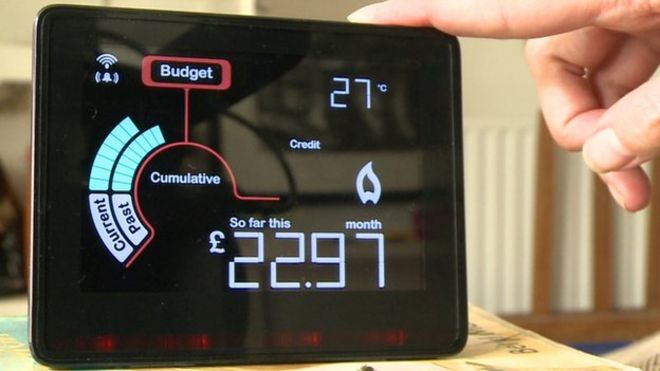Business
Smart meter rollout 'needs private
sector input'
By Joe Lynam
Business correspondent, BBC News
13 June 2015
From
the section
Business

The UK-wide rollout of smart meters needs to be run by someone outside of government, the company set up to promote the project has said.
The UK-wide rollout of smart meters
needs to be run by someone outside of government, the company set up to promote
the project has said.
By 2020 every home should have a
digital meter, which communicates directly with energy suppliers and can allow
more efficient energy usage.
Smart Energy GB said government was
"not good" at such projects and warned it it could cost more than the
budgeted £11bn without private sector input.
The government has rejected the call.
Olympic delivery
The last Labour government announced
plans in 2009 for every home in Britain to be installed with smart meters,
which the government and energy firms believe could lead to savings of an
estimated £17bn.
But Smart Energy GB fears that with
1.6 million of the proposed 26 million smart meters currently installed, the
timetable could slip and end up costing consumers more than the budgeted £11bn.
Baroness Margaret McDonagh, the
chairman of Smart Energy GB, said that the installation of smart meters throughout
the UK was a giant infrastructure project, and was similar in scope to the
building of the HS2 rail line and the Olympic venues.
"As we know from experience,
governments are not good at big infrastructure projects because it's not their
business," she said.
"To do these things well, you
need to be doing them all the time. When a body can focus on these things with
a date in mind - like the Olympic delivery - they can achieve it on time and on
budget."
She is calling for the government to
appoint a chief executive from the private sector to run the project.
But the Department for Energy and
Climate Change (DECC) has rejected the idea.
"Last year, an independent
review on the smart meters programme backed the current delivery model, which
is going to deliver the benefits of smart meters at the lowest possible cost to
billpayers," said a spokesperson for the DECC.
It is hoped that smart meters will
encourage consumers to be more selective on how they use energy by choosing,
for example, to run the washing machine at a time when electricity charges are
lower.
In the near future this will be even
easier as the "internet of things" takes hold. This means new devices
will come onto the market which will communicate with the smart meter and
switch themselves on and off at the most energy efficient times.
But apart from consumers saving
money, the biggest winners from the nationwide installation of smart meters
will be energy companies themselves.
That is because the current analogue
systems prevent the efficient distribution of energy to our homes. More
electricity is allocated for each home on the off-chance that it will be
needed. With smart meters, the power will only come from the grid, the moment
it is actually required.
But smart meters are expensive and
time consuming to install in every single household in Britain. About 6% of the
total number of homes have a smart meter already.
To achieve the full 100% and meet the
Conservative party election promise, a massive ramp up in the installation
process will have to start immediately.
No comments:
Post a Comment